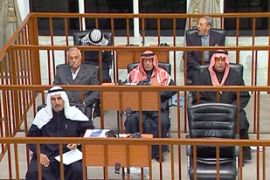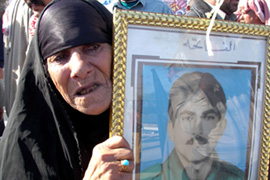Iraqi Shia uprising trial begins
Saddam’s cousin is on trial again, this time for his role in a crackdown on Shia in 1991.

 |
| Iraqis are still demanding justice for those killed in the uprising [GALLO/GETTY] |
He said the next day Majid and fellow defendant Abdel Ghani Abdel Ghafour came to the detention centre where “Majid shot dead three people and also the girl when she tried to talk to him.”
Saddam’s forces used helicopter gunships and tanks to defeat the rebels, and it is estimated that between 60,000 and 100,000 people were killed.
This happened after US generals relaxed no-fly rules in the area.
Since the 2003 US-led invasion, Iraqi and international experts have exhumed dozens of mass graves of those killed in the uprising, and their reports are expected to be the key evidence during the trial.
Officials have said that approximately 90 victims and witnesses are expected to testify against the 15 defendants.
Hoda Abdel-Hamid, Al Jazeera’s Iraq correspondent, said that the trial is unlikely to capture the public’s attention given the many problems Iraqis currently face.
“Right now, the priority for people is completely different,” she said.
“Whether its in the south or central of their country there are too many problems. People say they are on survival mode.
“People say there are problems that need dealing with now rather than putting on trial what happened in the past.”
Long list
Sultan Hashim al-Tai, a former defence minister, and Hussein Rashid al-Tikriti, an ex-armed forces deputy chief of operations, were sentenced to death in an earlier genocide trial but are among those accused.
A nine-member appeal court is currently reviewing the death sentences given to al-Majid, al-Tai and al-Tikriti for a 1988 gas attack that killed thousands of Kurds in the village of Halabja.
If the sentence is upheld, the three will have to be executed within 30 days, according to Iraqi law.
In such a case, all charges against them in connection with the Shia uprising would be dropped.